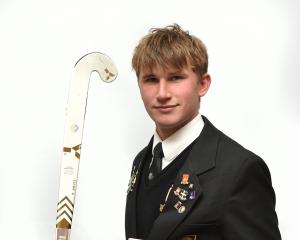Making it big in the small satellite market is the aim of Rocket Lab and a former Otago man is playing his part. Kim Dungey reports.
Lots of kids dream of blasting rockets into space. Lachlan Matchett is making it happen.
- Still class acts ten years on
- The Kiwi business reaching out to the world
- Class Act: Where are they now?
The former Palmerston man is head of propulsion at Rocket Lab, leading the design of the engine that powers its Electron rocket and that could help revolutionise the way small satellites are launched into orbit.

The Kiwi-American company wants to ''democratise'' access to space by providing a frequent, affordable launch service for small satellites that at present mostly ride-share on other missions.
Matchett says the 17m-long rocket and its 10 engines were designed to be fast to manufacture on a mass scale and new technologies were the key to its success.
Named after New Zealand-born physicist Ernest Rutherford, the Rutherford engine is the first of its kind to use 3-D printing for all primary components: an entire engine can be produced in just 24 hours.
The rocket uses carbon composite tanks that are compatible with liquid oxygen, providing significant weight savings over aluminium. Electric motors and lithium polymer batteries - not gas generators - drive the turbo-pumps, making the whole design much simpler thermodynamically, allowing for modifications through software changes and improving pumping efficiency by about 30%.
It can carry a 150kg payload into low-Earth orbit (about 500km above the Earth's surface) - the target range for the booming small satellite market.
These machines are used to conduct scientific research, collect weather and maritime data and provide internet, positioning and earth imaging services from space.

Earlier this year, the Electron launched from the Mahia peninsula on the east coast of the North Island, taking only 12 minutes to reach a height of 500km and successfully deploying three small satellites for Planet and Spire Global.
For Matchett, who was at mission control in Auckland remotely monitoring the propulsion systems on the rocket, every day at work is a blast but this was a highlight.

''It was, like, five year's of work leading up to that one moment. There are not many people who get the opportunity to work on something for that long and to see a result like that ... We definitely had a bit of a celebration.''
Like Rocket Lab founder Peter Beck, who grew up in Invercargill and completed a tool-making apprenticeship at Dunedin's Fisher and Paykel workshops, Matchett spent much of his youth tinkering in his family's shed.
Dad Alan is team leader at the Dunedin Botanic Garden and mum Jane, a Waitaki District Council parks officer, but his interest lay more in gas turbines than gardening: ''I liked doing technical things and taking on a big challenge''.
At 17, the East Otago High School pupil built his first turbo-based lpg-fuelled jet engine, using a few spare car parts, a borrowed welder and information from the internet.
The engine, which eventually exploded, was powerful enough to barbecue a sausage, he told the Otago Daily Times back then, but not strong enough to power anything useful.
Next, he completed a degree in mechanical engineering and a masters in trajectory optimisation at Canterbury University, also helping to build the institution's first supersonic rocket. Named Sarah, after a team member's girlfriend, it was launched near Lake Ellesmere and is believed to have reached 2200kmh before landing in the sea.
Matchett joined Rocket Lab as employee number ''five or six'' in 2013, the same year it moved its company registration to the United States. It's 1.2ha production facility in California now churns out a rocket a month but research and development continues to be based in Auckland. About 270 people are on the payroll.
Beck has described Engineering New Zealand's 2017 Young Engineer of the Year as a ''phenomenal engineer and leader'' who is detail-orientated and runs his projects with finesse. Matchett pays tribute to his talented colleagues and says one of the key requirements of the job is being a ''relentless problem solver''.
Managing the development of the engine from concept through to flight qualification and production has been, and continues to be, a large part of his life. So when the Otago Daily Times called on a recent Saturday, it was not surprising to find him in his office with its adjoining workshop and production line. During the week, he rarely leaves before 8pm.
''I do a bit of mountain biking in my spare time. But there's not much of that, to be honest.''
''I've got a lot of responsibilities, so that means I spend a lot of time making sure I keep on top of them ... It's an exciting work environment so I always enjoy it.''
The job involves managing a large team of engineers and aligning propulsion activities - design, manufacture, tests and launches - with the company's immediate and future goals.
Next year, Rocket Lab plans to launch from both the world's first private orbital launch pad at Mahia - a location that benefits from New Zealand's lack of air and marine traffic - and a new site in the US.
Eventually, it hopes to lift off once a week, with dedicated launches from a competitive $US5.7 million.
However, being in the space industry means coping with complications, and the company has had its share: technical issues, unfavourable weather and even a boat straying into the exclusion zone near the launch pad, forcing a launch to be scrubbed minutes before lift-off.
It's first fully-commercial flight, scheduled for April, has been delayed twice because of problems with a motor controller and is now set down for November.
''That's rockets ...'' the 28-year-old engineer says, adding that even Nasa experiences setbacks.
''You just have to be persistent and you get through it.''
Rocket Lab has progressed more quickly than other privately-funded companies developing launch vehicles for the small satellite market, and it might seem surprising that New Zealanders are at the forefront of this new kind of space race.
But Matchett says they see no problem as being too big to solve.
When developing the Rutherford engine, he and his team ''started with nothing, and went out to do something a bit different''.
''New Zealanders don't have the same history, resource or education options locally that other larger countries do with regard to aerospace,'' he says.
''Because of this, we look at different ways to solve the same problem, which can result in novel solutions - if it works out that is.
''I think most Kiwis are really enthusiastic and proud that we are doing this because it's pretty cool and exciting for New Zealand.''
''We just need to launch more rockets. There are plenty of customers.''
And his advice to this year's crop of school leavers? To do what they love and not limit themselves.
''If you're passionate about something, you'll be happy in your work and happy in life as well.''












